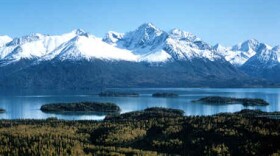Kim McGinnis is passionate about boosting Alaska’s economy. And she hopes a recent award from the University of Alaska Foundation will allow her to help entrepreneurs in the state by connecting them with venture capital.
In late July, she was awarded the Harold T. Caven Professorship in Business and Finance. The professorship started in 1974, and is a memorial gift by the Caven family in honor of Harold, a former director and president of First National Bank Alaska.
McGinnis was selected for her proposal to help build capacity for venture finance in Alaska. She recently spoke with Alaska Public Media’s Ava White from KUAC in Fairbanks, where she said this new professorship allows her to give her students more hands-on opportunities.
Kim McGinnis: For me it's an opportunity to have a little bit of extra funding to put to work for a project, in this case supporting the venture capital community of Alaska. I think it's an environment where funding is a little bit constrained, it's just a wonderful opportunity to build those industry connections for students, to bridge research and practical work in Alaska, and to really bring a passion project to bear. We don't always get the opportunity to do that in our day jobs.
Getting students these hands-on experiences in the venture capital or angel investing community, it takes a lot of resources. It allows me to give these really meaningful opportunities to students that otherwise we may not have the scale to achieve. It also gives me a little bit of funding to work on research and projects with the entrepreneurial community of Alaska, at a time where otherwise, a lot of my time will be spent teaching and in the classroom.
The only other thing I've been thinking about with this professorship that I'm really excited about is doing more work, specifically in rural Alaska. Because it is really different the kind of businesses and the kind of needs you see in some of the rural communities versus in some of the larger urban communities.
I'm really excited about using this professorship to bridge that gap and understand the needs of entrepreneurs in rural Alaska as well. They say necessity is the mother of invention, and there are just so many different needs based on the unique climate and conditions and logistical challenges of living and working in rural Alaska.
Ava White: Tell me more about your proposal.
KM: What I propose to do is basically three things, supporting student involvement in angel and venture investing in Alaska, and doing that through supporting student involvement in this program called the Alaska Angel Conference.
We started a partnership with the Alaska Angel conference a couple of years ago. It's this hands on 12 week long program where it brings together startup businesses in Alaska and burgeoning angel investors. It's a really low barrier to entry, relatively speaking. It's a unique program that brings these two groups together and provides training for both of them. It's a competitive process, and the startup that the investors select at the end of the competition receives, sometimes up to $100,000 in funding, which can be really meaningful for an early stage business.
A couple of years ago, we started getting students involved in it. We purchased shares in this program on behalf of our students, using funds from the student investment fund, which allowed several students to go through this process. We've had amazing outcomes. One of them is working for one of the startups that they evaluated. Another has gone on to work at UAF.
Also, taking some of the training and materials we develop to help teach students about angel and venture investing and creating bite sized little pieces of training that could be used for the general public as well. I find that a lot of people have a lot of apprehension about how to start investing, whether that's in stocks and bonds or in a startup business, and so helping to take some of that risk and fear out of the process, I think it helps overcome a big barrier for people.
The last piece of the proposal was allowing me to spend a little more time with rural entrepreneurs in particular, to better understand some of the challenges they face, because there's been a little bit of research about what it's like to be an entrepreneur in a rural context. But a lot of that takes place oftentimes in developing countries. And we know Alaska is kind of a different beast. It doesn't quite look like the rest of the US or the lower 48 but it also doesn't really look like a developing country in Asia or Africa, so it's institutionally different.
AW: What is it about new businesses in Alaska that excites you? And are there any particular sectors that you particularly enjoy working with?
KM: I think what got me excited right off the bat is this statistic that 89% of job growth in Alaska is generated by startup businesses. This is an amazing source of job creation in the state.
I get excited about seeing my students succeed. I get excited about creating new businesses and generating economic activity in Alaska. When all these things overlap, and all these things kind of come together, and we can do good in the state economy, I can do right by my students, and we can help new businesses, it's exciting.
AW: Are there any strategies or tips that you give to startups in Alaska that maybe those in the lower 48 don't worry about or aren't as impacted by?
KM: I think one of the big differences in Alaska is that there aren't a lot of sources of financial capital here, but there are a lot of sources of what we'd call social capital. A lot of what entrepreneurs can leverage here is the relationships they have, the people they know.
It's a really tight knit community, so using every connection in your network is probably the biggest ticket to success here.
AW: What are those specific areas around the state with those exciting emerging sectors, and what are they?
KM: Most of the startup businesses in Alaska, when we talk about geography, are concentrated around Anchorage, but there are businesses throughout the state. In terms of the sectors, it's an interesting mix: you have some of these startup businesses that are more retail focused, you have things like outdoor apparel and food items. And then you have businesses that are a little bit higher tech, everything from advanced materials that are designed for building in specific conditions, like extreme cold. We've seen some really interesting innovations and ideas coming out of the biotechnology space as well.
It's neat to be at a university, because I get to see that side of the entrepreneurship process as well, and it does look a little bit different if you're going at it as a researcher who's like an expert in some really technical fields, versus, someone who started a business in their basement in their spare time.
Both are successful and interesting approaches, and both are really necessary in the economy, but you get a really diverse range of startup businesses here in Alaska.
Correction: The award is through the University of Alaska Foundation.







